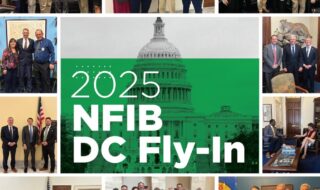February 13, 2024 Last Edit: July 21, 2024
The Prove It Act will enforce requirements to analyze impact of regulations on small business
The input from small businesses when developing federal regulations is crucial to avoid costly regulatory burdens. The Prove It Act will strengthen the requirements for agencies to analyze the impact of regulations on small businesses and increase small business engagement in the regulatory process. On Feb. 1, NFIB sent a letter in support of this legislation.
“NFIB members rate ‘unreasonable government regulation’ as one of the top concerns facing small businesses,” explains Josh McLeod, Director of Federal Government Relations. “Unfortunately, the red tape and compliance burdens of small businesses continue to grow exponentially.”
A recent analysis shows the total cost of federal regulations in 2022 was $3.079 trillion. The study found that the average U.S. company pays approximately $13,000 per employee to comply with federal regulations.
The pace of regulations is drastically increasing with even more regulatory costs and paperwork hours proposed by the administration. The Regulatory Flexibility Act (RFA) was enacted to minimize the disproportionate impact that federal regulations have on small businesses. However, as NFIB’s 2023 study found, agencies use loopholes in the RFA to underreport, minimize, or ignore the impact of regulations on small businesses.
“This circumvention of the RFA is unacceptable and small businesses ultimately pay the regulatory price in forgone growth and opportunity,” says McLeod. “That is why legislation like the Prove It Act is so important. The Prove It Act seeks to address the loopholes in the RFA by increasing small business input in the regulatory process and strengthening the requirements for agencies to examine the impacts of regulations on small businesses.”
NFIB signed a coalition letter to the House Committee on Small Business and House Committee on the Judiciary urging legislative action to strengthen the input of small businesses in federal regulatory processes and ensure the intent of the RFA is fulfilled.
NFIB’s Small Business Legal Center released a White Paper on the RFA, which explored the importance of the RFA, the lack of RFA compliance by administrative agencies, and what today’s Congress can do to reinvigorate the RFA.
“Now is the time for Congress to address the loopholes that enable federal agencies to underreport, minimize, or ignore the impact of regulations on small businesses,” says McLeod. “On behalf of small businesses across the country, NFIB urges Congress to prioritize legislation that reinforces the intent of the RFA and encourages an environment where Main Street businesses can grow and thrive.”
TAKE ACTION: Share personal stories about how federal regulations have impacted your small business. NFIB will use this information to educate lawmakers about the regulations that hurt small businesses the most.
NFIB is a member-driven organization advocating on behalf of small and independent businesses nationwide.
Related Articles













